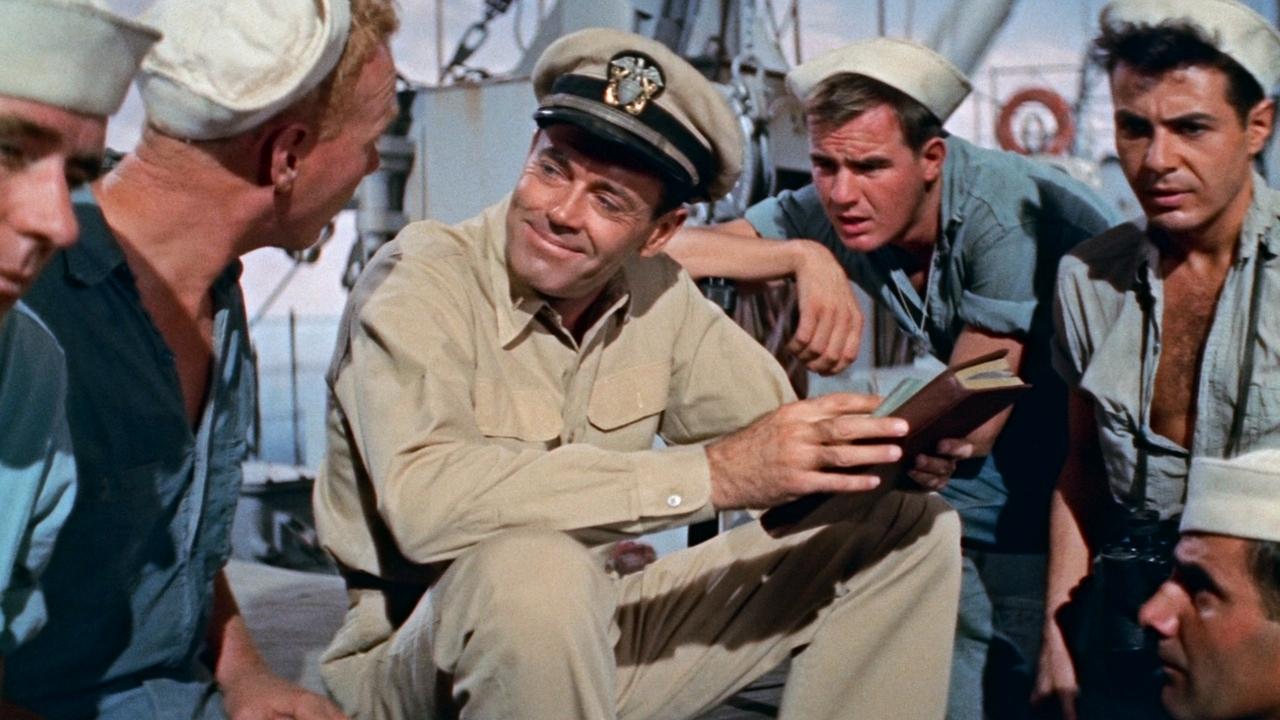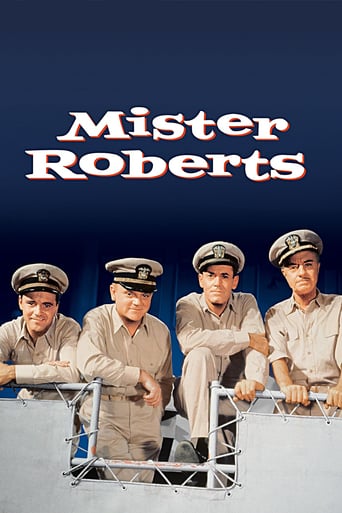

Very very predictable, including the post credit scene !!!
... View Morejust watch it!
... View MoreIn truth, there is barely enough story here to make a film.
... View MoreClever and entertaining enough to recommend even to members of the 1%
... View MoreThis movie is really a good one, with great actors that we know already. The story of a crew of navy men during the WW 2 on the Pacific Ocean that try to have fun but the captain of the ship doesn't want to hear a thing. Lt. Roberts, played by Fonda, tries to convince his superior to give them the chance to have a permission for 24 hours. Pulver, played by Lemmon, is a real troublemaker and a man who desperately wants to meet the girls on shore. Roberts tries as well to join the front because he's tired of boredom. As the movie goes through the end, a tragic event makes the crew and especially Pulver astonished by reading the letter of a friend of his. Frustated, Pulver finishes the job where Roberts started....
... View MoreThis movie is an all time favorite for me. I first saw it at an age too young to remember and have watched it many times over(I have my own copy, of course). Its lack of special effects(unless the soap suds can be considered special), The feeling that you could be sitting in a Broadway playhouse even though its a movie, the way it kept my attention without the use of non stop action or violence(are soap suds violent?) and its many great lines make it dear to me. I often use the the James Cagney line "who did it?" at work when a snafu occurs and my "superiors" need a target for their fingers(even though this tends to make me a target)! a do a doo a doo a do do do
... View MoreA comedy-drama about life on a not particularly important ship of the US Navy during World War II...Henry Fonda makes a solid leader (I mean, gee, he played Abraham Lincoln) on board a ship with a selfish, almost hermit-like captain (played effortlessly by James Cagney -- some of his best work, albeit in a small role). Who better to be the anchor on this ship of men lost at sea (figuratively)? And Jack Lemmon... oh my. He really lets his hair down here. He has some great roles throughout his career, but here he just goes the full way to perfection. How does such a character survive on such a stressful ship? Who knows? But he is the perfect comedy relief in what is otherwise too tense of a story.
... View MoreThis is the sort of movie that Americans take for granted, but that in China would get you thrown in jail -- for watching it or making it. There are other countries in Asia and elsewhere where a movie like this simply could not be made even today because it glorifies individualism and standing up to authority. I mentioned in my comments on "Baby Face" how Warner Bros. was the studio that featured rebels and that broke social rules. This is a typical example, although the story would seem tame by today's standards. I'm not sure how it was received at the time, particularly by the Navy, but I doubt it generated a rash of mutinous behavior, in part because James Cagney's character was so thoroughly dislikable that few actual Navy captains could live down to such a standard. Nobody on this Navy ship respects the captain, and they only obey him grudgingly. And it is not a joke. More precisely, they detest him. How many countries would condone such a theme? The first time I saw this was as a youngster in a 16 mm screening to an audience of old Navy sea dogs (it was actually shown outdoors during a rendezvous on a beach). I have seen it many times over the years, and it still moves me. This is an unusual movie in that it is even more powerful when you do know the ending. And coming to know more about the history of WWII has increased my understanding of what people like this were going through.It's only weakness is that the acting of the secondary cast falls into a stylized form of some 50s movies that is not as realistic as in some modern movies. But Cagney's performance is so biting that you have to remind yourself he really was a human being off the set, and a gentle one, at that. This is a classic example of Fonda's cool, almost detached acting. We see a very young Jack Lemmon who is the precise opposite. And then there is the wise old doctor, William Powell, star of the 1930s, who retired after this film, who turns in a masterful, moving performance. He is the one who brings the most emotion to his role. With these four stars we see four different styles of acting, and strongly contrasting personalities, another mark of the individualism that makes this movie interesting. We also see some of the John Ford stable of actors: Ward Bond and Ken Curtis, who put in very different performances than were seen in Ford's Westerns.I have seen so many foreigners ripping apart any American war movie, and I can hear their litany: more American patriotic propaganda, makes it seem like America won the war by themselves, doesn't give any credit to England or ______ (fill in the blank) for actually defeating ______ , etc. Well, in 1955 I assume Hollywood was making Mr. Roberts for domestic consumption, unlike today, when American movies travel everywhere by DVD, cable or internet. Yes, there was a patriotic element to some films back in the 1950s, even though The War was long over. There were people like Mr. Roberts who truly wanted to do their part to help win and end the war, even if it meant volunteering for duty to risk their lives. And, yes, it was not just Americans who fought bravely in The War. So many men sacrificed their lives for freedom, and I do not use that word lightly, because that's what was at stake in WWII. When you hear about the thousand or millions who were in The War it becomes a blur. When you focus on one person, it becomes real. This movie focuses on Mr. Roberts, one individual who wanted to do his duty to his country, but he represents so many others, men who died in the war, or survived, or who just plain endured boring but necessary jobs. I guess that's what "Mr. Roberts" represented to those retired Navy sailors and officers long ago.While you could say this is a back-handed form of Hollywood patriotism, "Mr. Roberts" is, in the end, really just an entertaining movie. I'll let all you foreigners in on a secret: Americans do not go to patriotic movies that are boring. We go to movies to be entertained. Heck, we even go to movies that are anti-American, if they are entertaining.In the end, the timid Ensign Pulver picks up where Mr. Roberts left off. Watch closely as Lemmon enters the captain's office. Cagney is sitting there reading a comic book.
... View More